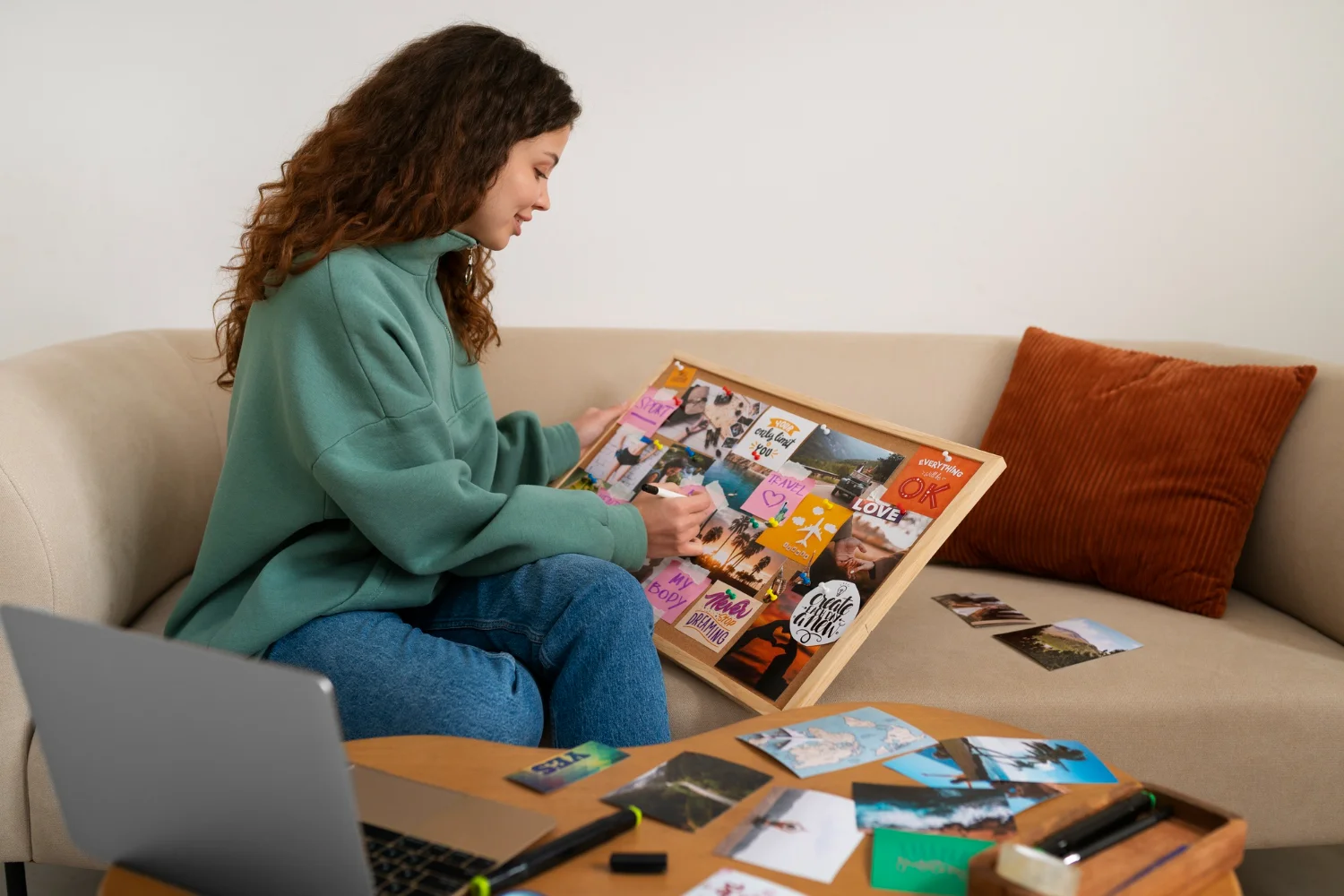
Okay, real talk—have you ever laid in bed at like 2 AM wondering what the hell you’re supposed to be doing with your life? Like, everyone else seems to have it figured out, they’re out here with their careers and their plans and their five-year goals, and you’re just… existing? Going through the motions? Wondering if there’s supposed to be more to life than working, eating, sleeping, and occasionally binge-watching shows you’ve already seen?
Yeah, me too. Welcome to the club. Membership is free, and we meet whenever we have an existential crisis, which is honestly pretty often.
Here’s the thing about finding your life purpose—nobody talks about how confusing and messy it actually is. We see people on Instagram living their “best life” and we think they just woke up one day knowing exactly what they were meant to do. But that’s garbage. Most people are figuring it out as they go, making it up, trying stuff, failing at stuff, and slowly piecing together what feels right.
So if you’re feeling lost right now, like you’re wandering through life without a map or a destination, that’s actually totally normal. You’re not broken, you’re not behind, you’re just in the middle of the journey.
And I’m going to help you figure some stuff out. Not in a cheesy, watch-this-TED-talk kind of way, but in a real, practical, “let’s actually do something about this” kind of way.
Ready? Let’s go.
1. Stop Looking for One Single “Purpose” (Because That’s Not How It Works)
First things first—we need to talk about this whole “life purpose” thing, because I think the concept is kind of messed up.
Everyone acts like you’re supposed to find this one magical purpose, this singular thing you were born to do, and then boom, everything makes sense and your life has meaning forever. Like you’re a character in a movie who discovers they’re the chosen one.
But that’s not real life, okay?
Real life is messier than that. Your purpose isn’t one thing, it’s a bunch of things. It changes as you change. What felt meaningful when you were 20 might feel completely different when you’re 40. And that’s fine. That’s actually good. It means you’re growing.
So stop putting so much pressure on yourself to find THE purpose, like it’s hidden treasure buried somewhere and you just need the right map. Instead, start thinking about purpose as something you build, bit by bit, through the choices you make and the things you care about.
Try this: Write down three things that make you feel alive right now. Not what you think SHOULD make you feel alive, but what actually does. Maybe it’s making people laugh, or solving problems, or taking care of animals, or creating stuff with your hands. Start there. Your purpose is probably hiding in those feelings.
2. Pay Attention to What Makes You Lose Track of Time

You know that feeling when you’re doing something and suddenly three hours have passed and you didn’t even notice? When you look up from what you’re doing and you’re shocked that it’s dark outside because it feels like you just started five minutes ago?
That’s important. That’s your brain telling you something.
Psychologists call it “flow state,” but I just call it “the thing that makes time disappear.” And whatever makes time disappear for you is probably connected to your purpose in some way.
For me, it’s writing. I can sit down to write something at 2 PM and suddenly it’s 7 PM and I forgot to eat lunch and my coffee is cold and I have no idea where the time went. For my friend Mike, it’s fixing cars. He can spend an entire Saturday under the hood of some old truck and come out covered in grease and happy as hell.
What does it for you?
The thing is, we often dismiss the stuff that makes us lose track of time because we think it’s “just a hobby” or “not practical” or “not a real career.” But that’s where meaning lives, in those moments when you’re so absorbed in something that everything else fades away.
Try this: For the next week, keep a note on your phone. Every time you look up and realize time passed without you noticing, write down what you were doing. At the end of the week, look for patterns. That’s your purpose leaving breadcrumbs.
3. Think About What Pisses You Off (Seriously)
This might sound weird, but the things that make you genuinely angry can point you toward your purpose.
Not like, road rage angry or “they messed up my coffee order” angry. I mean the deep stuff. The injustices that make your blood boil. The problems you see in the world that make you think “why isn’t anyone fixing this?” The suffering that you can’t just ignore and move on from.
Because anger, when it’s about something bigger than yourself, is often just passion in disguise. It’s your values showing up and saying “hey, this matters, pay attention.”
Maybe you get furious about environmental destruction. Or kids going hungry. Or people being treated unfairly. Or animals suffering. Or broken education systems. Or healthcare inequality. Whatever it is, that fire in your chest is telling you something about what you care about deeply.
And the things we care about deeply? That’s where purpose lives.
My friend Sarah spent years working in corporate marketing, making good money, checking all the boxes of what she was “supposed” to do. But she was miserable. Then one day she saw a documentary about the foster care system and got so angry she couldn’t sleep. Within a year, she’d quit her job and started a nonprofit helping foster kids. Now she’s broke-ish and tired all the time, but she’s never been happier, because she’s doing something that matters to her.
Try this: Make a list of three things that genuinely upset you when you think about them. Not surface-level annoyances, but real problems that you wish you could fix. Then ask yourself: what would it look like if I actually tried to do something about this?
4. Ask Yourself What You’d Do If Money Didn’t Matter

I know, I know, this question is so overused it’s basically a cliché at this point. But it’s overused because it works.
Here’s why: most of us make decisions based on what pays the bills, what’s practical, what our parents think is a good idea, what will impress people. We’re so busy worrying about money and stability that we forget to ask what we’d actually want to do if we had the freedom to choose.
So let’s do a thought experiment. Imagine you wake up tomorrow and somehow you have enough money to live comfortably for the rest of your life. Not crazy rich, just secure. You never have to worry about rent or food or healthcare ever again.
What would you do with your time?
And I don’t mean “I’d lay on a beach forever,” because we both know that would get boring after like a week. I mean, after you got all the vacation out of your system, what would you do? How would you spend your days? What would feel meaningful enough to get out of bed for?
Be honest. Would you teach? Create art? Build things? Help people? Grow food? Write stories? Fix broken stuff? Make people laugh? Whatever it is, that’s probably pointing you toward your purpose.
Now here’s the reality check: you probably can’t just quit your job tomorrow and do that thing full-time. Bills are real. But you can start making space for it. An hour here, a weekend there. You can move toward it, even if you can’t jump into it completely right now.
Try this: Write down your answer to the money question. Then ask yourself: what’s the smallest possible version of this I could start doing right now? Even if it’s just 30 minutes a week, start there.
5. Look at What You Did as a Kid (Before the World Told You Who to Be)
Kids are kind of genius at knowing what they like, you know? Before anyone tells them they should be a doctor or a lawyer or whatever pays well, before they learn to worry about being practical or impressive, they just… do what feels good.
Think back to when you were like 8 or 9 or 10 years old. What did you do for fun? What made you excited? What could you do for hours without anyone forcing you?
For me, I used to write these elaborate stories and force my younger brother to act them out with me. I’d make up entire worlds with characters and plots and drama, and I’d get so into it that I’d forget about everything else. Looking back now, it’s kind of obvious that writing and storytelling were always my thing. But I spent years ignoring that because I thought I was supposed to do something more “serious.”
Maybe you were always building stuff with LEGOs or taking apart electronics to see how they worked. Maybe you were the kid who organized all the neighborhood games, or the one who took care of every injured animal you found. Maybe you spent hours drawing, or making up dances, or reading every book you could get your hands on.
Those childhood interests aren’t just random. They’re clues about what naturally lights you up before you learned to overthink everything.
Try this: Call someone who knew you as a kid—a parent, an older sibling, a childhood friend. Ask them what you were always doing, what you were good at, what made you happy. Sometimes other people remember things about us that we’ve forgotten.
6. Notice Who You’re Jealous Of (And Why)

Jealousy is uncomfortable, right? We’re supposed to be happy for other people’s success and not compare ourselves and all that healthy stuff. But jealousy can actually be super useful if you pay attention to it.
Because the people you’re jealous of? They’re probably doing something you wish you were doing. They’re living some version of a life that appeals to you. And that envy you feel is just your soul saying “hey, I want that too.”
Here’s the key though: you have to dig deeper than the surface. Are you jealous of someone’s Instagram-perfect life, or are you jealous of what that life represents? Are you envious of their money, or are you envious of their freedom? Their fame, or their creative expression? Their success, or their courage to try something new?
I have this friend who was always jealous of travel bloggers. She’d see their photos from Thailand or Peru or wherever and feel this tight, bitter feeling in her chest. For a while she thought she was just envious of the travel itself. But when she really examined it, she realized what she actually envied was their freedom and their willingness to take risks and build unconventional lives.
Once she figured that out, she realized she didn’t have to become a travel blogger. She just had to find her own version of that freedom and risk-taking. Now she runs a remote business and travels when she wants, and the jealousy is gone.
Try this: Make a list of three people (they can be people you know or famous people) whose lives make you feel a little jealous. Then for each one, write down specifically what about their life triggers that feeling. The specifics matter more than the people.
7. Experiment Like Your Life is a Science Project

Here’s something nobody tells you: you can’t figure out your purpose just by thinking about it. You have to actually try stuff.
It’s like trying to decide what you want to eat by just reading the menu over and over. At some point, you have to order something and taste it.
Too many people get stuck in analysis paralysis, researching and planning and thinking about what they might want to do someday. But your purpose isn’t something you discover in your head, it’s something you discover through experience.
So start experimenting. Try different things. Volunteer for a weekend. Take a class in something random. Start a side project. Have conversations with people in different fields. Say yes to weird opportunities. Do stuff that scares you a little bit.
Some experiments will suck. You’ll try things and realize “nope, definitely not this.” That’s fine. That’s actually good. Figuring out what you DON’T want is just as valuable as figuring out what you do want. You’re narrowing down the possibilities.
I tried stand-up comedy once because I thought maybe I wanted to be a comedian. Turns out, no. I absolutely hated the pressure and the performance anxiety and the feeling of bombing in front of drunk people. But that experience helped me realize I like making people laugh through writing, where I can edit and think and not have to deal with immediate reactions. So it wasn’t a waste, even though it didn’t work out.
Try this: Pick three things you’ve always been curious about but never tried. They can be small things—a pottery class, a coding bootcamp, volunteering at an animal shelter, whatever. Do one per month for the next three months. See what sticks.
Resources for experimenting:
- Meetup: https://www.meetup.com (find local groups trying new things)
- Skillshare: https://www.skillshare.com (cheap classes in everything)
- VolunteerMatch: https://www.volunteermatch.org (find volunteer opportunities)
8. Ask Yourself: What Would I Regret NOT Doing?

Flip the question around for a minute. Instead of asking what you want to do, ask what you’d regret not doing.
Imagine you’re 80 years old, sitting on your porch, looking back at your life. What would make you sad if you never tried it? What would make you think “I wish I had…”?
This question cuts through a lot of the noise, you know? Because regret has a way of showing us what really matters. The things we’d genuinely regret not doing are usually the things connected to our deeper values and desires, not just the stuff we think we’re supposed to want.
Most people don’t regret the things they tried that didn’t work out. They regret the things they were too scared to try. They regret playing it safe. They regret not telling someone how they felt, or not chasing that dream, or not taking that risk.
My grandpa worked in a factory his whole life. Good job, steady paycheck, provided for his family. But when he was in his 70s, he told me he wished he’d tried to be a musician. He used to play guitar and write songs when he was young, but he thought it was impractical, so he gave it up. He didn’t seem bitter about it exactly, just… sad. Like there was this whole version of himself he never got to meet.
I think about that conversation a lot. I don’t want to be 70 years old wondering about the version of myself I was too scared to become.
Try this: Set a timer for 10 minutes and write down everything you can think of that you might regret not doing or trying. Don’t filter yourself, just write. Then read through the list and circle the three that would hurt the most to never attempt.
9. Find Your People and See What Happens
Here’s something I’ve noticed: purpose often shows up when you’re around the right people.
Because when you find your people—the ones who get you, who share your values, who care about the same stuff you care about—you start to see possibilities you couldn’t see before. They inspire you. They challenge you. They show you different ways of living and thinking.
Plus, a lot of purpose is found in community, you know? In connecting with others and contributing to something bigger than yourself. So finding your people isn’t just nice for social reasons, it’s actually part of finding meaning.
I spent years feeling lost and disconnected, working a job I hated, not really sure what I was doing with my life. Then I randomly went to a writing workshop and met this group of people who were all trying to write and create and figure out their voices. And being around them changed something in me. Their creativity was contagious. Their courage made me braver. Their struggles made mine feel less lonely.
Within six months of finding that community, I’d quit my corporate job and started freelancing. I don’t know if I would have had the guts to do that without them.
So where do you find your people? Honestly, you have to put yourself out there a little bit. Go to events related to things you care about. Join online communities. Take classes. Show up to the same coffee shop and become a regular. Start conversations. Be a little vulnerable about what you’re interested in and what you’re struggling with.
Try this: Identify three communities or groups that align with something you care about or are curious about. They can be online or in-person. Join them this month and participate at least once. See if any of them feel like home.
Resources for finding community:
- Reddit communities for basically everything: https://www.reddit.com
- Facebook groups (yeah, it’s still useful for this)
- Local community centers and libraries often have bulletin boards with group meetings
10. Give Yourself Permission to Not Have It All Figured Out
Last one, and maybe the most important: you need to give yourself permission to be uncertain.
We live in this culture that’s obsessed with having it all together, with knowing exactly where you’re going and having a plan and being productive and purposeful every single second. And that’s exhausting. It’s also unrealistic.
The truth is, most people are making it up as they go. Even the ones who seem super confident and sure of themselves. Even the successful ones with the impressive careers and the TED talks. They’re figuring it out too, just like you.
And that’s okay. That’s human.
You don’t have to have your whole life figured out right now. You don’t have to know exactly what your purpose is or where you’re headed or what you’ll be doing in five years. You just have to take the next step, whatever that is.
Purpose isn’t this fixed destination you arrive at. It’s something you build gradually, through experiences and choices and mistakes and growth. It’s okay to be in the messy middle of that process.
Sometimes the best thing you can do is just admit “I don’t know what I’m doing and I’m trying to figure it out” and then keep moving forward anyway. There’s power in that honesty, you know? It takes the pressure off. It lets you be human.
Try this: Write yourself a permission slip. Literally. “I give myself permission to not have it all figured out. I give myself permission to try things and fail. I give myself permission to change my mind. I give myself permission to be in process.” Sign it. Keep it somewhere you’ll see it when you’re feeling lost.
The Real Talk You Need to Hear
Okay, so we’ve covered 10 ways to discover your purpose. But I want to be straight with you about something.
Finding your purpose doesn’t magically fix everything. It doesn’t make life suddenly easy or clear or without problems. You can know your purpose and still have bad days. You can be living a meaningful life and still feel lost sometimes.
Because here’s the thing: life is complicated, and meaning isn’t some constant state of enlightenment where you feel fulfilled every second of every day. That’s not real. Real life is messy and confusing and full of contradictions.
Some days you’ll feel like you’re exactly where you’re supposed to be, doing exactly what you’re meant to do. Other days you’ll feel like you’re completely lost and nothing makes sense. Both of those feelings are valid. Both of them are part of being human.
What finding your purpose does is give you a North Star, you know? Something to orient yourself toward when you feel off course. It gives you a sense of direction even when you can’t see the whole path. It helps you make decisions that align with what matters to you.
But it’s not a magic solution. It’s just one piece of building a life that feels good to live.
Your Next Move
So what now? You just read a bunch of stuff about finding purpose. Where do you start?
Here’s my suggestion: pick one thing from this list. Just one. The one that resonated most or scared you the most or made you think “yeah, I should probably do that.”
And do it this week. Not someday, not when you have more time, not when you feel ready. This week.
Because you know what? You could read a hundred articles about finding your purpose and watch a thousand TED talks and follow every inspiring quote account on Instagram. But none of that matters if you don’t actually do something different.
Your purpose is waiting for you, but you have to go find it. It’s not going to knock on your door and introduce itself. You have to put in the work. You have to be willing to try stuff and fail and try again. You have to be brave enough to be honest with yourself about what you want and what matters to you.
And yeah, it’s scary. Figuring out what you’re supposed to be doing with your life is terrifying because it means you might have to change things. You might have to disappoint people or take risks or admit that you’ve been on the wrong path.
But you know what’s scarier? Getting to the end of your life and realizing you never really lived it. You just went through the motions. You played it safe. You did what everyone expected instead of what your soul needed.
So start now. Pick one thing. Do it this week. Take one step toward a life that feels like yours.
Your purpose is out there, waiting for you to find it. Or maybe waiting for you to create it.
Either way, it’s time to start looking. 🌟



Leave a Reply